New Delhi: At her house in Pakshirajapura village in Karnataka, Radha, a Hakki Pikki tribal member, frantically decants her brand of Adivasi hair oil into rows of empty bottles. Orders are pouring in from all over the world on WhatsApp, and her family has stepped in to help. At Rs 1,500 for a 500ml bottle, her ‘Original Adivasi Hair Oil’ claims to be the panacea for every ailment—hair fall, balding, dandruff and grey hair.
With celebrities and influencers such as Elvish Yadav and Farah Khan endorsing Adivasi oils as elixirs, Hakki Pikki tribal community members have emerged as successful entrepreneurs in the hair oil industry. Today, almost every Hakki Pikki family in Pakshirajapura village near Mysuru is manufacturing and marketing traditional Adivasi hair oil. About a hundred brands are manufacturing this oil, claimed S Sreekanth, director of Mysuru’s DEED (Development through Education) NGO. Sreekanth has spent over three decades advocating for tribal rights.
Brands include Adivasi Ajay Hair Oil, Neelambari Adivasi Hair Oil and Official Adivasi Hair Oil, which all compete with each other. They are even available on Amazon, Flipkart, and other leading e-commerce platforms. However, some manufacturers from the Hakki Pikki community have claimed otherwise, stating that many so-called Adivasi hair oils on these platforms are fake; they can only be purchased from their registered websites. Either way, it’s an old tribal recipe packaged as new wine—riding the influencer-social media wave and obsession with all things natural.
Our family has been making this oil for centuries using 118 herbs — a Hakki Pikki community member associated with Neelambari Adivasi Hair Oil
In one promotional video for Neelambari Hair Oil, a Hakki Pikki man opened his bun so that Bollywood filmmaker Farah Khan could see his long, straight, black hair unravelling to his waist.
“Oh my God,” said Khan, as the man claimed it had grown in just one month. Brand owner Sandeep quickly explained that the oil isn’t for baldness but works for those with some hair.
“Very good. At least Sandeep ji isn’t making false promises. It’s not for hair growth but for repairing and strengthening,” Khan said in the video, which has garnered over 10 lakh views so far. “I will go and use it for six months and send you a video.”
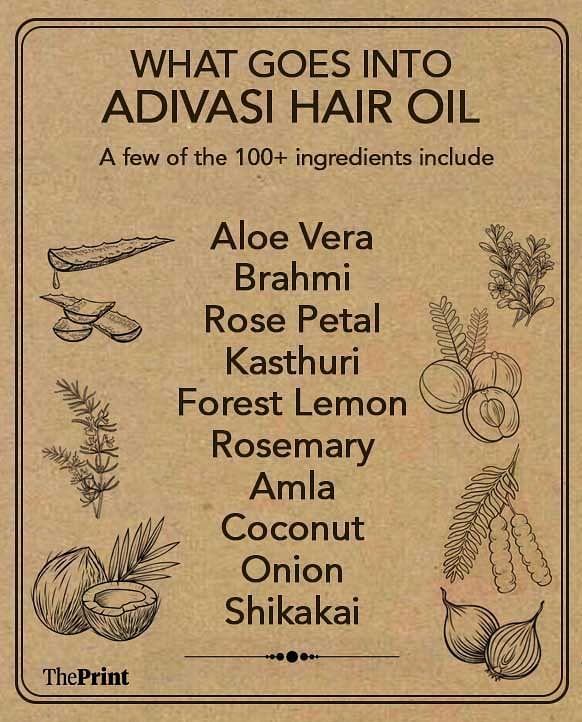
Actor Sonu Sood, RJ Naved, and comedian Bharti Singh have also visited Pakshirajapura village to promote different brands of Adivasi hair oil. They create videos on their YouTube channels and reels on Instagram, encouraging people to try this oil.
Use this oil for six months and see the results—Radha, a Hakki Pikki manufacturer of Adivasi hair oil
However, it is not as organic as most consumers like to think. Over the last few months, the more well-established Hakki Pikki entrepreneurs have been actively reaching out to celebrities and influencers and hashing out deals with them. Nobody wants to talk about the money that has exchanged hands.
“Our family has been making this oil for centuries using 118 herbs,” said a Hakki Pikki community member associated with Neelambari Adivasi Hair Oil.
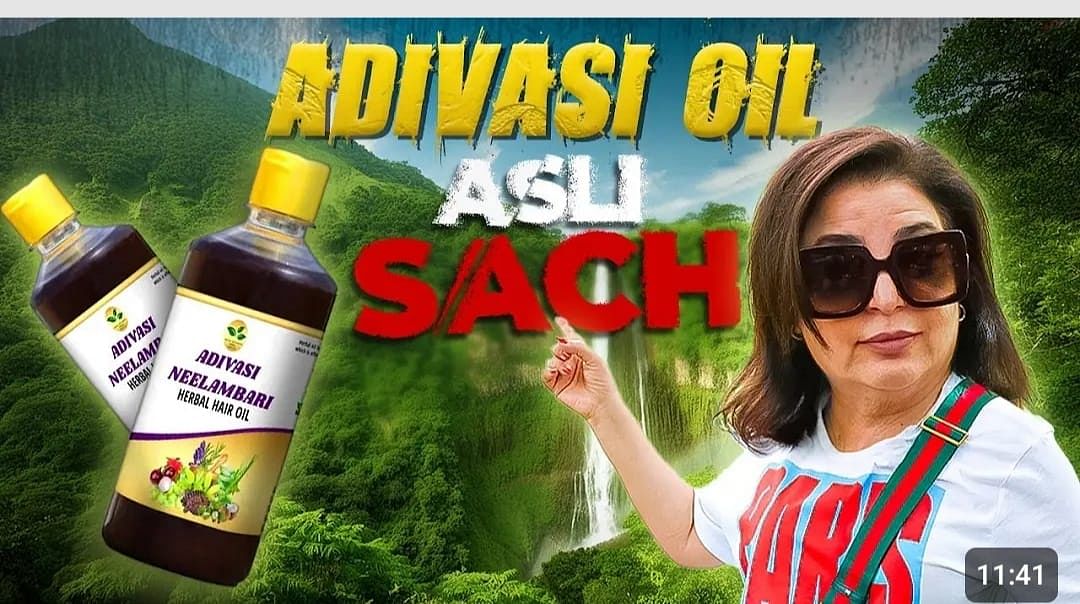
“Our herbal medicine and oil have high demand in the international market,” he added.
Now, families are competing. Many entrepreneurs have set up websites, each claiming to be the ‘original’ Adivasi hair oil. Smaller business owners like Radha, on the other hand, set up stands at local fairs and conduct door-to-door campaigns in cities like Bengaluru and neighbouring Tamil Nadu and Kerala.
When she started out in 2017, Radha used to receive around 200 to 500 orders a month. Now, she gets as many as 2,000 orders from Tamil Nadu to Delhi, and even Sudan, Nigeria Thailand, Dubai, and Kenya.
“Use this oil for six months and see the results,” she said confidently over the phone.
Big names, bigger promotions
All the men in RJ Naved’s over six-minute-long promotional video have long lustrous locks. In it, he is seen greeting the Hakki Pikki members with warm hugs before driving to the village to learn how the oil is made. He, too, is promoting Neelambari Hair Oil, one of the more recognised brands in India. As he talks to a Hakki Pikki woman—with thick black hair—a yellow banner runs at the bottom of the clip urging customers to ‘Order now.’
Their oil-making process builds confidence and demonstrates its authenticity — RJ Naved
Naved did not discover this oil on his own. His manager initially approached him with a proposal to promote the product and shoot a video in Karnataka. It was a paid gig.
“It’s personal. I’m not comfortable discussing the details of the deal,” said Naved.
Due to his limited knowledge of the community, he requested representatives from the brand to visit him in Delhi first. Three community members, armed with samples and information, promptly travelled to Delhi to see the RJ.
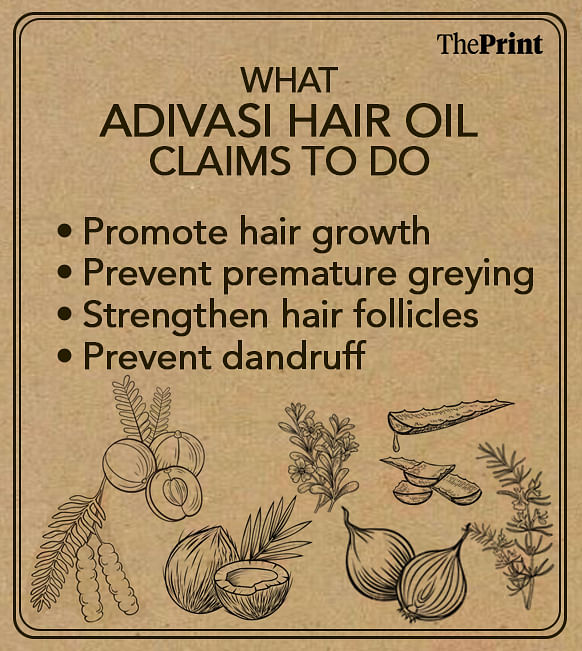
“I am particular about the brands I promote,” said Naved who asked his team to verify the hair oil’s claims. After they visited the village and saw for themselves how the oil is prepared, Naved agreed to promote it. The clip even shows him flying to Bengaluru and driving down to Mysuru to Pakshirajapura village.
“Their oil-making process builds confidence and demonstrates its authenticity,” he said.
If Naved and Khan’s YouTube clips are chock full of information and good intentions, then content creator Tarun Namdev’s Instagram clip is more on the farcical side.
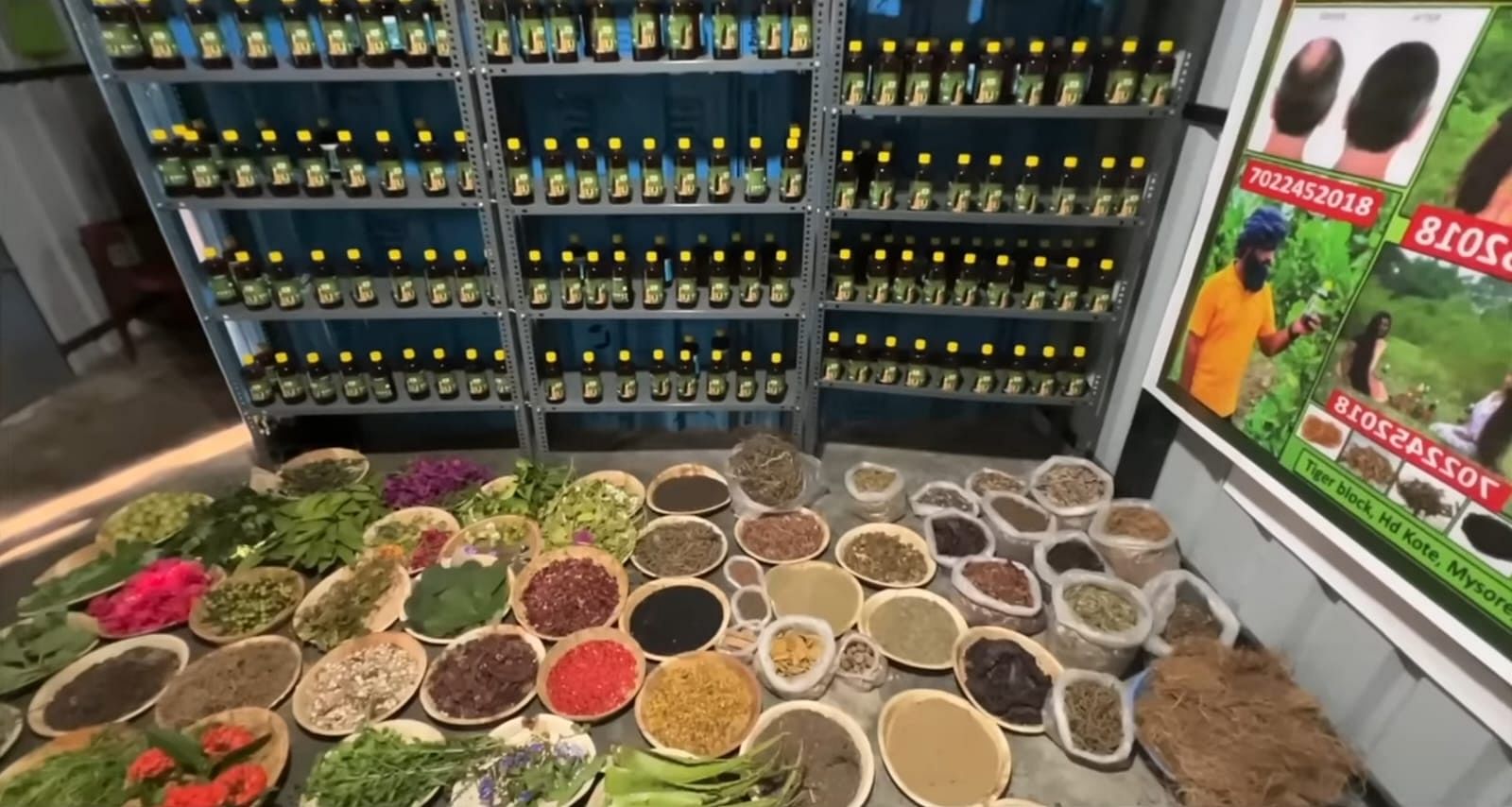
While prancing around in a lush green field in a mundu, he stumbles upon a person with long black hair. He can only see the back of the person but is entranced by the hair. Like an over-the-top Bollywood hero, he prances toward the person and strokes the hair, only to discover that it’s a man.
“Do you think you’re a girl? How did you get your hair to grow this long in the first place?” Namdev asks the man. After a brief encounter with other Hakki Pikki members, the secrets of Adivasi hair oil are revealed to him.
There’s a concerted effort by many of the larger Hakki Pikki Adivasi hair oil brands to draw in influencers, many of whom refer to the oil as chamatkari (miraculous).
“There is a lot of hard work put into the oil that goes into our hair,” said Farah Khan in her vlog.
The basic process to make the oil involves cooking over a hundred herbs – such as kasturi, rose petals, aloe vera, and forest lemon – in oil for about 12 hours. The mixture is allowed to cool before being strained and bottled. Hakki Pikki entrepreneurs constantly reinforce the message that their hair oil is chemical-free and traditional.

“It is presented to the public in its traditional form as a natural product, ensuring it remains accessible to a broad consumer base. This approach attracts consumers who are looking for high-quality, natural hair care solutions,” said a Hakki Pikki community member who did not wish to be named.
His colleague, another Hakki Pikki entrepreneur, explained that they go out of their way to attend functions, fairs and festivals, where they meet potential influencers. “If they promote us, it creates a ripple effect.”
Promotional shoots are organised regularly along with traditional dance performances. They have even learned Hindi, English, and Tamil to spread the word. It helps them market their oil in different states and widen their market.
One popular video, ‘Living in jungle with Adivasi for a day’ has over 2 lakh views. In it, a young influencer with bated breath announces that she is going to fly from Delhi to Karnataka to meet the Hakki Pikkis. “There are many hidden secrets that I am going to unveil in this video today,” she said in the video, almost hyperventilating with excitement.
Also read:
The Hakki Pikkis
Unlike most scheduled tribes, the semi-nomadic Hakki Pikkis (bird catchers) have travelled outside the country in search of fortune. Many have settled in African countries like Sudan and become herbal healers.
This exposure has helped them thrive and tap into their innate entrepreneurial spirit.
“The Hakki Pikki is distinct from other tribal communities. Unlike others who may be more reserved, the Hakki Pikkis are not shy and quickly adapt to modernity, largely due to their nomadic nature. They are not confined to one place and have a natural inclination to explore,” said Sreekanth. The Hakki Pikki migrated to Karnataka from parts of Gujarat and Rajasthan at least a hundred years ago. After bird catching and hunting were outlawed under the Wildlife Protection Act of 1972, they turned to marketing traditional medicine.
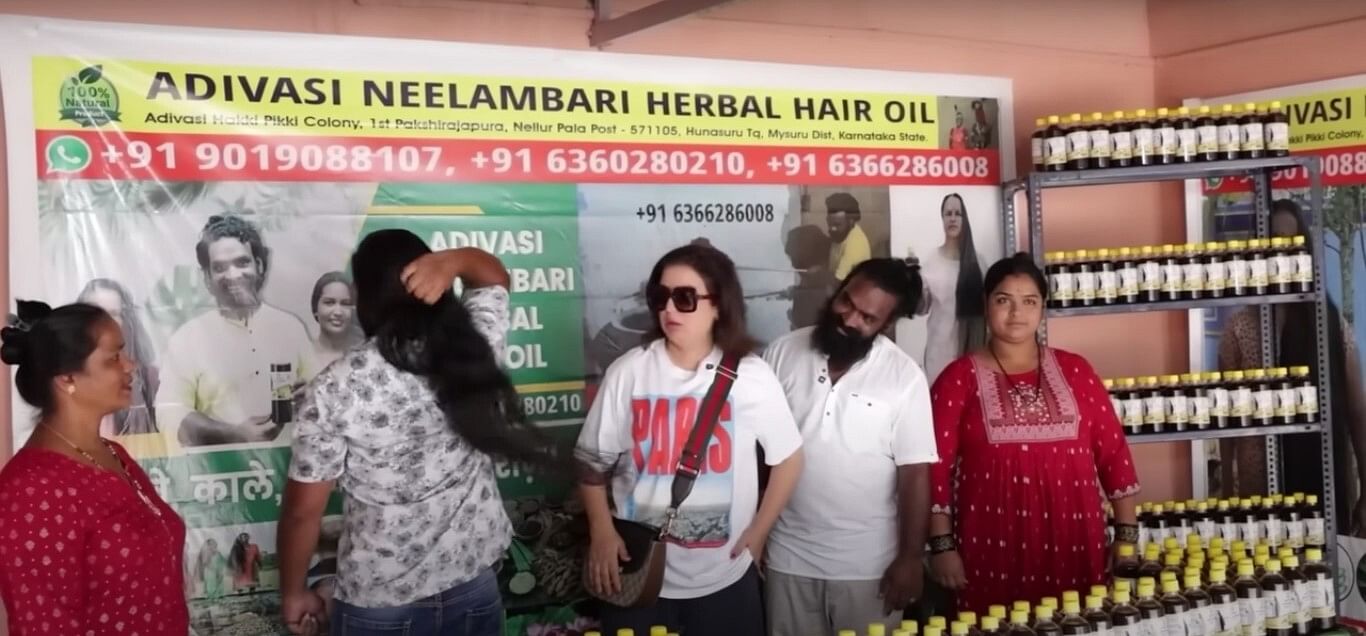
They travel to African countries, trade in herbal medicine and oil, offer massages and charge high fees, Sreekanth said, adding that “people also tend to believe in herbal products for hair care rather than [those with] chemicals.”
Today, there are as many as 11,892 Hakki Pikkis in Karnataka and the Western states of India. Community members claim that at least 70 per cent of them are cashing in on the Adivasi hair oil trend. Several tribe members also said that the Karnataka government pointed them in this direction.
“State government officials encouraged us to take our oil to the people. After that, we started promoting it face-to-face in nearby villages and districts,” said Vinay, another oil businessman from the community. But it is the celebrity endorsements that have brought them the kind of fame big FMCG companies can only dream of.
The Hakki Pikki is distinct from other tribal communities. Unlike others who may be more reserved, the Hakki Pikkis are not shy and quickly adapt to modernity, largely due to their nomadic nature. They are not confined to one place and have a natural inclination to explore — S Sreekanth, director of Mysuru’s DEED NGO
The Hakki Pikki tribe gained national attention in 2023, when over 181 members, who were travelling to Sudan to sell herbal products in May that year, were caught in a 16-month war. Intense clashes had broken out in Khartoum in April 2023—between the Sudanese Armed Forces (SAF) and the Rapid Support Forces (RSF). The Indian government evacuated the Hakki Pikkis under Operation Kaveri, and Prime Minister Narendra Modi met the rescued individuals in Shivamogga.
An official from the Karnataka Tribal Welfare Department, on the condition of anonymity, told ThePrint that the Hakki Pikkis are frequently detained abroad for not having the required documents, or travelling on expired visas.
“The Karnataka government decided to help them with certifying their products. We also supported them in setting up centres for business purposes [in Pakshirajapura],” he added. According to the official, these centres were estimated to cost over Rs 1.5 crore each.
Also read:
Fake vs Original
Today, Adivasi hair oil has an almost cult-like status, but it’s not without its critics and naysayers. Perhaps because of its tall claims, and the fact that it’s unlikely that users will ever get the kind of hair the Hakki Pikkis have. There are plenty of disgruntled customers.
“Naved Bhai, how much money did you get? I ordered 1 liter for Rs 2500 for promotion, but did not get any results,” wrote one person in the comments section of the radio jockey’s YouTube vlog. Another warned potential customers that the product had no effect on his hair.
In one popular video, YouTuber and influencer Mohak Mangal broke down all the claims one-by-one. Dandruff? Adding more oil will not solve the problem.
“Hair turns grey when melanin production decreases in the body, which can happen due to genetics, ageing, nutritional deficiencies like Vitamin B12 deficiency or stress,” he said. “Does this hair oil change your genes? Does it stop ageing? The answer is no.”
He ended the reel with a warning: “My family members also ordered two bottles after seeing such ads. Please don’t make the same mistake.”
The pushback is as fierce as the slew of promotions, and they are increasingly gaining traction on social media.
Content creator Muskan Siddiqui (25) bought a bottle after seeing a promotional video by YouTuber Saba Ibrahim. But when she called the number flashing on the screen, she was directed to a website.
The promised elixir didn’t work for her. After a second use, her hair began falling and became extremely dry.
Muskan, while showing a bottle of Adivasi hair oil, claimed that after using the oil, her hair became dry and started falling off | Photo by special arrangement”I ordered the oil from their website, but the product I received was different. The bottle had a different package and label,” she claimed. “They are making fools of us. All the big celebrities on social media are promoting it. It’s everywhere. I thought it would work, but seeing my hair break made me feel bad.”
A few Hakki Pikki entrepreneurs that ThePrint spoke to claimed that consumers have been suffering due to snake oil salespeople and counterfeit products.
“Fake oils are dominating the market and ruining our reputation. They are manufactured in Gujarat, Andhra Pradesh, and Rajasthan. The government should ensure that our sales and market are not harmed by these counterfeit products,” said Vinay, a Hakki Pikki entrepreneur.
I ordered the oil from their website, but the product I received was different. The bottle had a different package and label – Muskan Siddiqui, content creator
For all their success, most Hakki Pikki tribal families continue to live in poverty. Many families still struggle to get government certification to market Adivasi hair oil. Community leader Nanjundaswamy wants the government to step in and provide more resources. This will help manufacturing families maintain quality even as they scale up operations.
There should be morals in business, he asserted. “A business without morality won’t survive.”
(Edited by Zoya Bhatti)



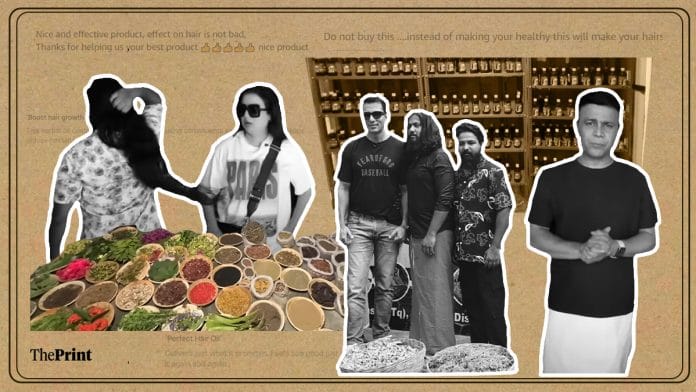



This was a fraud all along. Influencers and stars who promoted this must be prosecuted for being a part of this fraud.